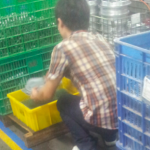 Before you can evaluate a Chinese manufacturer’s quality level or engineering capabilities, one thing should jump at you: are they well managed?
Before you can evaluate a Chinese manufacturer’s quality level or engineering capabilities, one thing should jump at you: are they well managed?
I made a list of 7 signs that you should observe when touring a plant. Let’s start at the top…
1. The boss keeps sipping tea with friends in his office
I know that being a good host is important in China. I know that personal relationships are important. But how can the boss stay on top of what happens if he spends 3-5 hours a day chatting and having tea?
2. The “general manager” has no authority
In many factories, the GM is also the legal representative, and is solely in charge of relations with local authorities.
In other words, he was chosen because he is local, he can drink a lot of baijiu, and he looks trustworthy. So why name him the GM? In that case, the formal structure on the org chart is meaningless.
3. Managers can’t give responses to precise questions
Have you ever asked a manager “can you describe how this QC check is performed?” or “how often do you calibrate this gauge?”, and a long conversation in Chinese was necessary before you got a response?
Why don’t they look at their records? Because they know the records are not maintained properly… Or they don’t even have records.
But, worse than that, the managers have no idea about the current situation. They discover a lot of things when customers ask questions.
The real problem is, they spend their time in offices and don’t care about what happens on the shop floor. I wrote about this before.
4. There is a lot of office space for production supervisors
In some factories, the workshop supervisors have a desk and a nominative email address. They like it because they feel they are mini-managers. And they spend hours every day doing email!
It keeps them away from where improvements must be made, and that’s a problem.
5. Many people, or small departments, have individual offices
People like to have their own office, right?
Sure, but I see more and more Chinese companies converting their office areas into open spaces.
Private rooms not only foster a lack of communication and coordination among the different departments, but they also make kickbacks (especially in purchasing) easier.
6. There is no effort at visual management
How often do you see a whiteboard with each workshop’s planning for the week?
How often do you see statistics about first-pass rate, production numbers, etc. posted on walls?
Very seldom, right? They don’t think of doing it, even when don’t have an ERP. The production supervisors see it as extra work, and the managers don’t ask for it. As a result, nobody knows this information.
7. The place is messy and dirty
In many workshops, scrap lies on the floor and piles of semi-finished products are everywhere.
This is actually related to the previous point. Good visual management can change how a whole factory operates.
For example, lines can be drawn on the floor with indication of where “good products” should be and where “bad products” should be. This way, for a very low budget, operators naturally follow a certain order. And many mistakes can be prevented!
What do you think? Can you think of other signs of mismanagement?

I love point 1 : ) “The boss keeps sipping tea with friends in his office”. Sadly this is the case with most of the factories I deal with. A great article very practical and street smart advise.
Thanks Prakash. Yes it might sound silly but most factory owners have no idea of what “management” and “leadership” really mean.